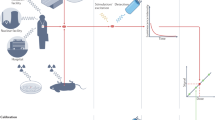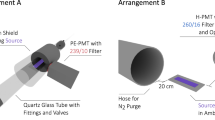Abstract
IN a recent number of the Comptes rendus of the Paris Academy (March 25) an account appeared by MM. P. Curie and A. Debierne of the production of a radio-active gas from radium. In their experiments some radium was placed in a glass vessel and the air exhausted by means of a mercury pump. It was found that the vacuum steadily decreased, due to the giving off of a gaseous substance from the radium. A small amount of the gas thus collected was found to be strongly radio.active. It caused phosphorescence in the glass tubes over which it passed, and in course of time blackened them. Substances exposed in the gas became themselves temporarily radio-active.
This is a preview of subscription content, access via your institution
Access options
Subscribe to this journal
Receive 51 print issues and online access
$199.00 per year
only $3.90 per issue
Buy this article
- Purchase on Springer Link
- Instant access to full article PDF
Prices may be subject to local taxes which are calculated during checkout
Similar content being viewed by others
Author information
Authors and Affiliations
Rights and permissions
About this article
Cite this article
RUTHERFORD, E. Emanations from Radio-active Substances. Nature 64, 157–158 (1901). https://doi.org/10.1038/064157a0
Issue Date:
DOI: https://doi.org/10.1038/064157a0
This article is cited by
-
Atomic number and isotopy before nuclear structure: multiple standards and evolving collaboration of chemistry and physics
Foundations of Chemistry (2023)
-
Celebrate the women behind the periodic table
Nature (2019)
Comments
By submitting a comment you agree to abide by our Terms and Community Guidelines. If you find something abusive or that does not comply with our terms or guidelines please flag it as inappropriate.



